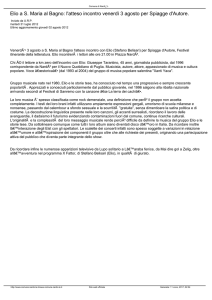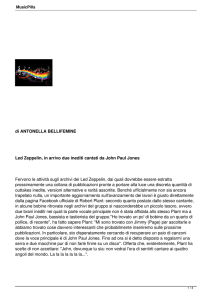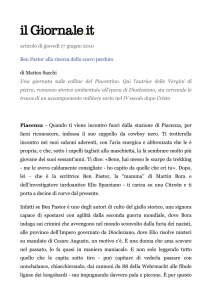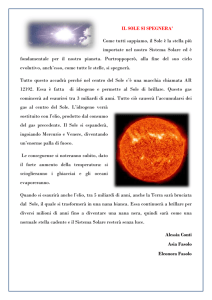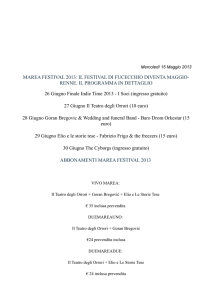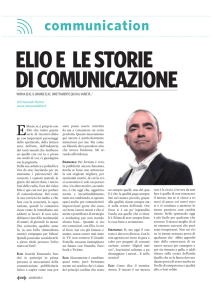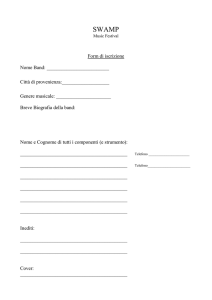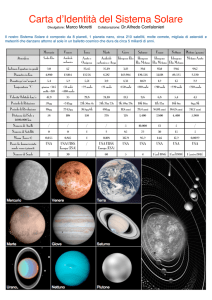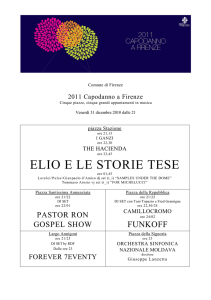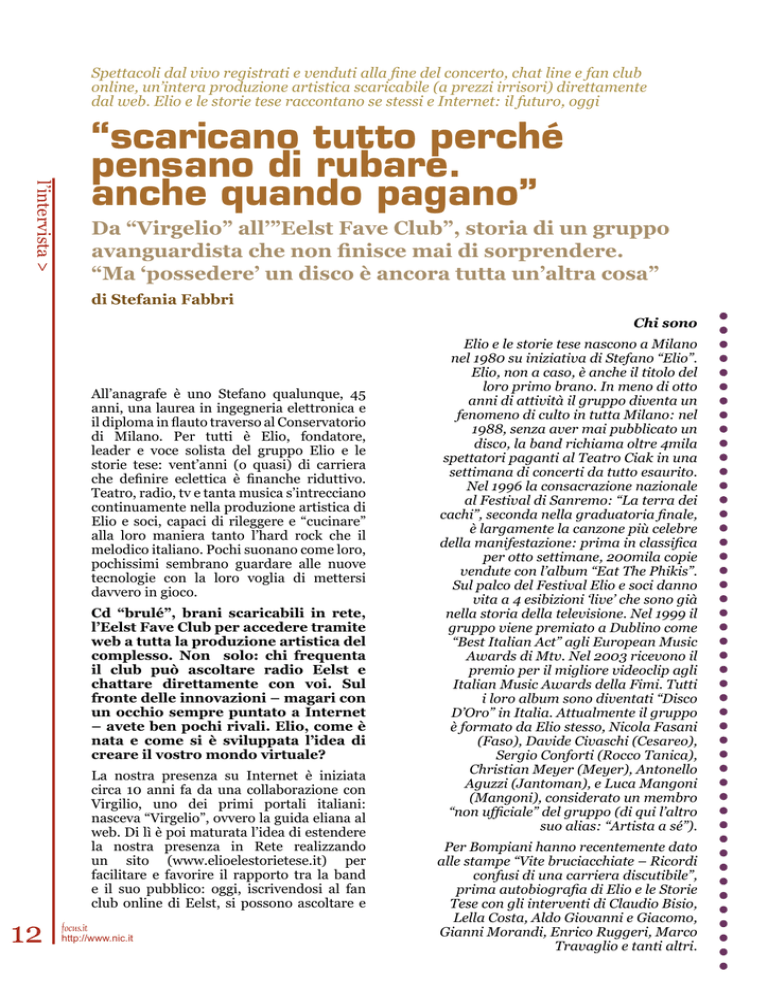
Spettacoli dal vivo registrati e venduti alla fine del concerto, chat line e fan club
online, un’intera produzione artistica scaricabile (a prezzi irrisori) direttamente
dal web. Elio e le storie tese raccontano se stessi e Internet: il futuro, oggi
l’intervista >
“scaricano tutto perché
pensano di rubare.
anche quando pagano”
Da “Virgelio” all’”Eelst Fave Club”, storia di un gruppo
avanguardista che non finisce mai di sorprendere.
“Ma ‘possedere’ un disco è ancora tutta un’altra cosa”
di Stefania Fabbri
Chi sono
All’anagrafe è uno Stefano qualunque, 45
anni, una laurea in ingegneria elettronica e
il diploma in flauto traverso al Conservatorio
di Milano. Per tutti è Elio, fondatore,
leader e voce solista del gruppo Elio e le
storie tese: vent’anni (o quasi) di carriera
che definire eclettica è finanche riduttivo.
Teatro, radio, tv e tanta musica s’intrecciano
continuamente nella produzione artistica di
Elio e soci, capaci di rileggere e “cucinare”
alla loro maniera tanto l’hard rock che il
melodico italiano. Pochi suonano come loro,
pochissimi sembrano guardare alle nuove
tecnologie con la loro voglia di mettersi
davvero in gioco.
Cd “brulé”, brani scaricabili in rete,
l’Eelst Fave Club per accedere tramite
web a tutta la produzione artistica del
complesso. Non solo: chi frequenta
il club può ascoltare radio Eelst e
chattare direttamente con voi. Sul
fronte delle innovazioni – magari con
un occhio sempre puntato a Internet
– avete ben pochi rivali. Elio, come è
nata e come si è sviluppata l’idea di
creare il vostro mondo virtuale?
La nostra presenza su Internet è iniziata
circa 10 anni fa da una collaborazione con
Virgilio, uno dei primi portali italiani:
nasceva “Virgelio”, ovvero la guida eliana al
web. Di lì è poi maturata l’idea di estendere
la nostra presenza in Rete realizzando
un sito (www.elioelestorietese.it) per
facilitare e favorire il rapporto tra la band
e il suo pubblico: oggi, iscrivendosi al fan
club online di Eelst, si possono ascoltare e
12
focus.it
http://www.nic.it
Elio e le storie tese nascono a Milano
nel 1980 su iniziativa di Stefano “Elio”.
Elio, non a caso, è anche il titolo del
loro primo brano. In meno di otto
anni di attività il gruppo diventa un
fenomeno di culto in tutta Milano: nel
1988, senza aver mai pubblicato un
disco, la band richiama oltre 4mila
spettatori paganti al Teatro Ciak in una
settimana di concerti da tutto esaurito.
Nel 1996 la consacrazione nazionale
al Festival di Sanremo: “La terra dei
cachi”, seconda nella graduatoria finale,
è largamente la canzone più celebre
della manifestazione: prima in classifica
per otto settimane, 200mila copie
vendute con l’album “Eat The Phikis”.
Sul palco del Festival Elio e soci danno
vita a 4 esibizioni ‘live’ che sono già
nella storia della televisione. Nel 1999 il
gruppo viene premiato a Dublino come
“Best Italian Act” agli European Music
Awards di Mtv. Nel 2003 ricevono il
premio per il migliore videoclip agli
Italian Music Awards della Fimi. Tutti
i loro album sono diventati “Disco
D’Oro” in Italia. Attualmente il gruppo
è formato da Elio stesso, Nicola Fasani
(Faso), Davide Civaschi (Cesareo),
Sergio Conforti (Rocco Tanica),
Christian Meyer (Meyer), Antonello
Aguzzi (Jantoman), e Luca Mangoni
(Mangoni), considerato un membro
“non ufficiale” del gruppo (di qui l’altro
suo alias: “Artista a sé”).
Per Bompiani hanno recentemente dato
alle stampe “Vite bruciacchiate – Ricordi
confusi di una carriera discutibile”,
prima autobiografia di Elio e le Storie
Tese con gli interventi di Claudio Bisio,
Lella Costa, Aldo Giovanni e Giacomo,
Gianni Morandi, Enrico Ruggeri, Marco
Travaglio e tanti altri.
modernissimo passaparola?
La teoria vuole che passare attraverso
Internet renda più semplice fare e divulgare
musica. In pratica, il popolo di Internet
è ancora composto da pochi eletti. Le
statistiche più recenti indicano che solo il
20 per cento della popolazione italiana è
connessa stabilmente alla Rete. Con questi
l’intervista >
scaricare - a piacere e senza alcun limite tutte le canzoni, i video, le foto e i testi di
15 anni della nostra produzione musicale,
dagli esordi ai giorni nostri. Cd “brulé” e
“Instant dvd” sono un ulteriore passo in
avanti: si tratta di cd audio o dvd video
registrati durante il concerto e venduti
al pubblico alla fine della performance.
Un’esperienza appassionante per noi artisti
e particolarmente… sconvolgente
anche per le persone: molti pensano a
un trucco, c’è una generale diffidenza
nel pensare che sia possibile, al
termine dello spettacolo, portarsi a
casa un cd o un dvd - numerato e in
tiratura limitata - contenente circa
un’ora del concerto che si è appena
visto.
Creare un rapporto senza
intermediari, dal produttore al
consumatore, è sicuramente un
approccio innovativo al mercato
musicale. Pagare direttamente
Elio e le storie tese per ascoltare
o scaricare la loro musica è
un’operazione che ha già buoni
riscontri economici o solo un
primo tentativo di riscrivere il
rapporto tra pubblico e artisti?
L’operazione, in sé, non ha ancora
grandi riscontri commerciali; dal
punto di vista economico il progetto
fa fatica a decollare. Chi si iscrive
al nostro club ha la possibilità,
a fronte di un abbonamento
trimestrale che costa appena 10
euro, di scaricare liberamente tutta
la nostra produzione: se si pensa
che un Cd qualunque costa in media
tra i 15 e i 20 euro si comprende
appieno la differenza tra un accesso
“tradizionale” alla musica e quello che
noi stiamo proponendo. Talmente
innovativo, direi, da rendere la gente
diffidente: ritengo che molti si iscrivano al
club e scarichino immediatamente tutta
la musica disponibile sul sito credendo di
compiere un atto illegale, quando invece
tutto è perfettamente lecito. La strada,
comunque, è quella tracciata da Itunes:
grazie al quale il download di musica crescerà
in modo esponenziale.
Anche Elio e le storie tese, come quasi
tutti i gruppi, devono probabilmente
l’inizio del proprio successo alle
voci “sommerse” sulla qualità delle
loro esibizioni. Possiamo pensare
a Internet come a un gigantesco e
numeri, e finché le cose resteranno così, non
si può pensare a sostituire il passaparola con
Internet.
Rimanendo ai vostri esordi: la musica,
da allora, è davvero radicalmente
cambiata? Prima il cd che ha
mandato in pensione i dischi, poi i
masterizzatori, infine l’mp3: può la
tecnologia impattare sull’essenza
stessa dell’espressione artistica?
No, non può. “Avere” il disco, possederlo
fisicamente non è equivalente a scaricare la
musica: la canzone ce l’hai, è virtualmente
identica, ma manca qualcosa. E’ la stessa
differenza che passa tra comprare il giornale
focus.it
[email protected]
13
l’intervista |
e leggerne l’edizione online: così come
molti non rinuncerebbero mai al piacere
di sfogliare la carta, tanti non intendono
privarsi del gusto di avere un disco. In
questo senso Internet è solo un modo più
veloce per avere subito a disposizione un
pezzo senza doverlo cercare girovagando
per mille negozi: ma questo sistema, almeno
nell’immediato, non potrà soppiantare i cd.
Sono celebri le vostre collaborazioni
con artisti italiani e stranieri: Irene
Grandi, Eugenio Finardi, Santana e
James Taylor, solo per citarne alcuni.
Cosa pensano i colleghi delle vostre
“innovazioni”? Li vedete ancora restii
nell’approccio ai nuovi media?
Tra gli amici musicisti Internet continua
a essere visto con
sospetto. La Rete e la
pratica dei download
vengono
associati
automaticamente alla
pirateria
musicale:
dunque, al furto e alla
perdita dei legittimi
diritti d’autore.
Dalla musica ai libri.
Recentemente
è
stata presentata la
vostra autobiografia,
“Vite bruciacchiate”.
Anche in questo
caso, dove è nata
l’idea?
L’esigenza di scrivere
un libro autobiografico
è sorta semplicemente
perché, a distanza di
anni,
cominciavamo
a dimenticare alcuni
episodi
del
nostro
passato.
La
storia
musicale del nostro
gruppo comincia ad
essere
abbastanza
lunga: alcuni fatti,
se non ci fossimo
affrettati a trascriverli,
sarebbero
andati
irrimediabilmente
perduti.
Il
libro
ripercorre aneddoti e
vicende legate ai locali
nei
quali
abbiamo
lavorato e agli altri
luoghi
che
hanno
segnato le tappe della
14
focus.it
http://www.nic.it
nostra carriera. Una storia che si ferma a 10
anni fa.
Ci sarà un seguito?
Solo se ci sarà qualcosa da scrivere. Gli anni
degli esordi, del resto, erano particolarmente
entusiasmanti. Certe cose probabilmente
non torneranno più.
Si può affermare, senza timore di
smentita, che Elio e le storie tese sono
davvero un passo avanti. Cosa c’è
dietro l’angolo?
Un nuovo disco, una tournée e
“Cordialmente!”, la trasmissione su Radio
Deejay che va avanti da ormai 15 anni. Più
una serie di sorprese che, naturalmente, non
vogliamo svelare: altrimenti che sorprese
sarebbero?
“they download everything
because they think they are
stealing. even when they pay”
From “Virgelio” to ”Eelst Fave Club”, the story of an
avant-garde band that never ceases to surprise us.
“But ‘to own’ a record is still a completely different thing”
the interview |
Live shows that are recorded and sold at the end of concerts, online chat lines
and fan clubs, and an entire artistic production (at laughable prices) that is
downloadable directly from the web. Elio e le storie tese talk about themselves
and the Internet: the future, today
by Stefania Fabbri
Who are they
Elio e le storie tese were formed in Milan
in 1980 on the initiative of Stefano “Elio”.
Elio, not by chance, was also the title of
their first song. In less than eight years the
group became a cultural phenomenon all
over Milan: in 1988, without ever having
released a record, the band drew over 4
thousand spectators to the Teatro Ciak in
a week of concerts that were completely
sold out. In 1996 at Italy’s premier music
festival in Sanremo their contribution “La
terra dei cachi” came second but is by far
the most famous song of the festival: it was
number one for eight weeks, and 200,000
copies of the album “Eat The Phikis” were
sold. On the festival circuit Elio and his
friends gave four live performances that
are already part of television history. In
1999 the band were awarded “Best Italian
Act” in Dublin at the MTV European Music
Awards. In 2003 they received a prize
for the best video-clip at the FIMI Italian
Music Awards. All of their albums have
gone “gold” in Italy. Their current lineup is Elio himself, Nicola Fasani (Faso),
Davide Civaschi (Cesareo), Sergio Conforti
(Rocco Tanica), Christian Meyer (Meyer),
Antonello Aguzzi (Jantoman), and Luca
Mangoni (Mangoni), considered a “non
official” member of the band (here his
other alias: “Artisti to himself”.
They have recently published with
Bompiani “Charred lives - confused
memoirs of a disputable career “, the first
autobiography by Elio e le Storie Tese
with contributions from Claudio Bisio,
Lella Costa, Aldo Giovanni e Giacomo,
Gianni Morandi, Enrico Ruggeri, Marco
Travaglio and many others.
Officially his name is Stefano, he’s 45
and a graduate in electronic engineering
and a diploma in flute from the Music
Conservatory of Milan. Everyone knows him
as Elio, the lead singer of the band Elio e le
storie tese: 20 years (or near enough) of a
career that to define as eclectic even seems
too limiting. Theatre, radio, TV and lots of
music are continually interwoven in the
artistic production of Elio and his partners,
capable of reinterpreting and “cooking” in
their own inimitable style hard rock and
Italian melodies. Few can play like they can,
few seem to look to new technology with
their desire to really meet new challenges.
“Burnt” CDs, downloadable tracks
on the Net, the Eelst Fave Club to
access over the web has all the artistic
production of the band. Not only
that: those who go to clubs can listen
to radio Eelst and chat directly with
you. On an innovative front, even in
terms of the Internet - you have few
rivals. Elio, how did you come up with
and develop the idea of your virtual
world?
Our presence on the Internet started about 10
years ago with a collaboration with Virgilio,
focus.it
[email protected]
15
the interview >
one of the main Italian portals: “Virgelio” was
born, or rather Elio’s guide to the web. From
then on the idea developed of extending
our presence on the Net by creating a site
(www.elioelestorietese.it) to facilitate and
promote the relationship between the band
and the public: now, by registering with the
online fan club Eelst, you can listen to and
download - easily and without any limits all the songs, videos, photos and texts from
15 years of our musical production, from our
debut.
“Burnt” CDs and “Instant DVDs” are the
latest step forwards: we’re talking about
audio CDs and DVDs recorded during the
concert and sold to the public at the end of
the performance. One fantastic experience
for us artists in particular...... and very
surprising for the public : many people think
it’s a scam, they are generally suspicious
when presented with
the possibility that at
the end of a show you
can take a CD or a DVD
home - numbered and
in a limited edition containing almost an
hour of the concert that
you have just seen.
Creating
a
relationship without
intermediaries,
from the producer
to the consumer
is
definitely
an
innovative
approach in the
music
industry.
Does paying Elio e le
storie tese directly
for listening to and
downloading their
music make good
business
sense
or is it an initial
attempt to rewrite
the
relationship
between the public
and the artists?
We haven’t seen any
big commercial benefits
yet; from an economic
point of view the project
is having a hard time
taking off. Whoever
registers with our club
has the possibility,
with a three-monthly
16
focus.it
http://www.nic.it
subscription that costs just 10 Euros, to
freely download all of our production: if you
think that the average CD costs between 15 to
20 Euros you can understand the difference
between “traditional” access to music and
what we are proposing. I’d say that it is so
innovative that it makes people suspicious:
I think that many people register with the
club and immediately download all the free
music from the site believing that they are
doing something illegal, when it’s actually
perfectly lawful. The way forward anyway
is with iTunes: thanks to which downloaded
music will increase exponentially.
Elio e le storie tese, like almost all
bands, probably owe the start of
their success to “underground”
voices in terms of the quality of their
performance. Can we think of the
Internet as a giant, modern word of
In theory the Internet does make it simpler
to make and popularize music. In practice,
the world of the Internet still involves a
small number of people. The most recent
statistics show that only 20 per cent of the
Italian population have a stable connection
to the Net. With these figures, and as long
as they remain like this, you can’t think in
terms of substituting word of mouth with
the Internet.
Let’s go back to your debut: has there
been a real radical change in music
since then? First the CD sent records
into retirement, then CD burning,
finally the MP3: can technology impact
on the essence of artistic expression?
No, it’s not possible. “To have” a CD,
to physically own it is not the same as
downloading music: The song is there, it’s
virtually identical but it’s lacking something.
It’s the same difference there is between
buying a newspaper and reading an edition
online: so like many who will never give up
the pleasure of leafing through paper, many
people won’t deprive themselves of having
the CD. In this sense the Internet is only a
quicker way to have something immediately
without having to hunt for it in thousands of
shops: but this system, at least for now, will
not take supplant the CD.
Your collaborations with Italian and
foreign artists are famous: Irene
Grandi, Eugenio Finardi, Santana
and James Taylor, just to name a few.
What do your colleagues think of your
“innovations”? Do you still see them
as tentative in their approach toward
new forms of media?
fthe interview |
mouth?
Among my musician friends the Internet
is still regarded with some suspicion. The
Internet and the practice of downloading
are automatically associated with musical
piracy: so with the theft and loss of the legal
rights of the author.
From music to books. Your autobiography
“Charred lives” was recently published.
Where did the idea for this come from?
The need to write an autobiographical book
came simply out of the idea that over the
years, we begin to forget some episodes from
our past. The musical history our band was
beginning to seem distant, if we didn’t hurry
to write it down, it would have been lost
forever. The book looks back at anecdotes
and events linked to the places where we
worked and other places that were focal to
our career. The story stops 10 years ago.
Will there be a follow-up?
Only if there’s something to write about.
The years of our debut and the rest were
particularly exciting. Some things will
probably never happen again.
There is no doubt that Elio e le storie
tese are really a step ahead. What is
there around the corner?
A new record, a tour, and “Cordialmente!”,
the recording on Radio Deejay that went out
15 years ago now. Plus plenty of surprises
that naturally, we don’t want to give away:
otherwise they wouldn’t be surprises, would
they?
focus.it
[email protected]
17

